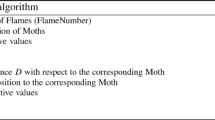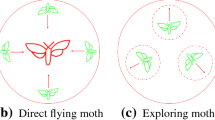Abstract
In this work, an improved moth-flame optimization algorithm is proposed to alleviate the problems of premature convergence and convergence to local minima. From the perspective of diversity, an inertia weight of diversity feedback control is introduced in the moth-flame optimization to balance the algorithm’s exploitation and global search abilities. Furthermore, a small probability mutation after the position update stage is added to improve the optimization performance. The performance of the proposed algorithm is extensively evaluated on a suite of CEC’2014 series benchmark functions and four constrained engineering optimization problems. The results of the proposed algorithm are compared with the ones of other improved algorithms presented in literatures. It is observed that the proposed method has a superior performance to improve the convergence ability of the algorithm. In addition, the proposed algorithm assists in escaping the local minima.

































Similar content being viewed by others
References
Pelusi D, Mascella R, Tallini LG, Nayak J, Naik B, Deng Y (2020) An improved moth-flame optimization algorithm with hybrid search phase. Knowl Based Syst 191:105277
Holland JH (1973) Genetic algorithms and the optimal allocation of trials. SIAM J Comput 2 (2):88–105
Storn R, Price K (1997) Differential evolution-a simple and efficient heuristic for global optimization over continuous spaces. J Glob Optim 11(4):341–359
Khodabakhshian A, Hemmati R (2013) Multi-machine power system stabilizer design by using cultural algorithms. Int J Electr Power Energy Syst 44(1):571–580
Kennedy J, Eberhart RC (2002) Particle swarm optimization. Proceedings of the 1995 IEEE International Conference on Neural Networks 4:1942–1948
Mirjalili S, Mirjalili SM, Lewis A (2014) Grey wolf optimizer. Adv Eng Softw 69:46–61
Mirjalili S, Gandomi AH, Mirjalili SZ, Saremi S, Faris H, Mirjalili SM (2017) Salp swarm algorithm. Adv Eng Softw 114:163–191
Dorigo M, Maniezzo V, Colorni A, et al. (1996) Ant system: optimization by a colony of cooperating agents. IEEE Trans Syst Man Cybern Syst 26(1):29–41
Yang X, Gandomi AH (2012) Bat algorithm: a novel approach for global engineering optimization. Eng Comput 29(5):464–483
Karaboga D, Akay B (2009) A comparative study of artificial bee colony algorithm. Appl Math Comput 214(1):108–132
Yang X (2010) Firefly algorithm, stochastic test functions and design optimisation. International Journal of Bio-inspired Computation 2(2):78–84
Rashedi E, Nezamabadipour H, Saryazdi S (2009) Gsa: A gravitational search algorithm. Inform Sci 179(13):2232–2248
Eskandar H, Sadollah A, Bahreininejad A, Hamdi M (2012) Water cycle algorithm - a novel metaheuristic optimization method for solving constrained engineering optimization problems. Comput Struct 110 (1):151–166
Kirkpatrick S, Gelatt CD, Vecchi MP (1983) Optimization by simulated annealing. Science 220(4598):671–680
Wang C, Wang B, Cen Y, Xie N (2019) Ions motion optimization algorithm based on diversity optimal guidance and opposition-based learning. Control and Decision: 1–13
Mirjalili S, Mirjalili SM, Hatamlou A (2016) Multi-verse optimizer: A nature-inspired algorithm for global optimization. Neural Comput and Applic 27(2):495–513
Kaveh A, Dadras Eslamlou A (2020) Water strider algorithm: A new metaheuristic and applications. Structures 25:520–541
Hayyolalam V, Kazem AAP (2019) Black widow optimization algorithm: A novel meta-heuristic approach for solving engineering optimization problems. Eng Appl Artif Intell 87:103249
Faramarzi A, Heidarinejad M, Mirjalili S, Gandomi AH (2020) Marine predators algorithm: A nature-inspired metaheuristic. Expert Syst Appl 152:113377
Faramarzi A, Heidarinejad M, Stephens B, Mirjalili S (2020) Equilibrium optimizer: A novel optimization algorithm. Knowledge Based Systems 191
Faris H, Alzoubi AM, Heidari AA, Aljarah I, Mafarja M, Hassonah MA, Fujita H (2019) An intelligent system for spam detection and identification of the most relevant features based on evolutionary random weight networks. Information Fusion 48:67–83
Faris H, Mafarja M, Heidari AA, Aljarah I, Alzoubi AM, Mirjalili S, Fujita H (2018) An efficient binary salp swarm algorithm with crossover scheme for feature selection problems. Knowl Based Syst 154:43–67
Taradeh M, Mafarja M, Heidari AA, Faris H, Aljarah I, Mirjalili S, Fujita H (2019) An evolutionary gravitational search-based feature selection. Inform Sci 497:219–239
Mirjalili S (2015) Moth-flame optimization algorithm: A novel nature-inspired heuristic paradigm. Knowl Based Syst 89:228–249
Yíldíz BS, Yíldíz AR (2017) Moth-flame optimization algorithm to determine optimal machining parameters in manufacturing processes. Materials Testing 59(5):425–429
Allam D, Yousri D, Eteiba M (2016) Parameters extraction of the three diode model for the multi-crystalline solar cell/module using moth-flame optimization algorithm. Energy Convers Manag 123:535–548
Lei X, Fang M, Fujita H (2019) Moth-flame optimization-based algorithm with synthetic dynamic ppi networks for discovering protein complexes. Knowl Based Syst 172:76–85
Xu Y, Chen H, Luo J, Zhang Q, Jiao S, Zhang X (2019) Enhanced moth-flame optimizer with mutation strategy for global optimization. Inform Sci 492:181–203
Chen H, Fu H, Cao Q, Han L, Yan L (2019) Feature selection of parallel binary moth-flame optimization algorithm based on spark. In: 2019 IEEE 3rd Information Technology, Networking, Electronic and Automation Control Conference (ITNEC). IEEE, pp 408–412
Wang P, Zhou Y, Luo Q, Fan C, Xiang Z (2019) A complex-valued encoding moth-flame optimization algorithm for global optimization. In: International Conference on Intelligent Computing. Springer, pp 719–728
Emary E, Zawbaa HM (2016) Impact of chaos functions on modern swarm optimizers. PloS one 11(7):e0158738
Xu L, Li Y, Li K, Beng GH, Jiang Z, Wang C, Liu N (2018) Enhanced moth-flame optimization based on cultural learning and Gaussian mutation. J Bionic Eng 15(4):751–763
Huang L, Yang B, Zhang X, Yin L, Yu T, Fang Z (2019) Optimal power tracking of doubly fed induction generator-based wind turbine using swarm moth–flame optimizer. Trans Inst Meas Control 41(6):1491–1503
Sapre S, Mini S (2019) Opposition-based moth flame optimization with cauchy mutation and evolutionary boundary constraint handling for global optimization. Soft Comput 23(15):6023–6041
Hongwei LI, Liu J, Chen L, Bai J, Sun Y, Kai LU (2019) Chaos-enhanced moth-flame optimization algorithm for global optimization. J Syst Eng Electron 30(6):1144–1159
Zhang H, Li R, Cai ZN, Gu Z, Chen M (2020) Advanced orthogonal moth flame optimization with broyden-fletcher-goldfarb-shanno algorithm: Framework and real-world problems. Expert Syst Appl 159:113617
Li C, Niu Z, Song Z, Li B, Fan J, Liu PX (2018) A double evolutionary learning moth-flame optimization for real-parameter global optimization problems. IEEE Access 6:76700–76727
Khalilpourazari S, Khalilpourazary S (2019) An efficient hybrid algorithm based on water cycle and moth-flame optimization algorithms for solving numerical and constrained engineering optimization problems. Soft Comput 23(5):1699–1722
Riget J, Vesterstrøm JS (2002) A diversity-guided particle swarm optimizer-the arpso, Dept. of Computer Science, University of Aarhus, Denmark 2 (2002)
Wang Y (2013) An improved ant colony algorithm based on the search for diversity. Computer Digital Engineering 41(6):896–898
Yang M, Li C, Cai Z, Guan J (2014) Differential evolution with auto-enhanced population diversity. IEEE Trans Cybern 45(2):302–315
Fang W, Sun J, Xu W (2008) Diversity-controlled particle swarm optimization algorithm. Control and Decision 23(8):863–868
Liang J, Qu B, Suganthan P Problem definitions and evaluation criteria for the cec 2014 special session and competition on single objective real-parameter numerical optimization. Computational Intelligence Laboratory
Mirjalili S (2016) Sca: A sine cosine algorithm for solving optimization problems. Knowl Based Syst 96:120–133
Belegundu AD, Arora JS (1985) A study of mathematical programming methods for structural optimization. Part i: Theory. Int J Numer Methods Eng 21(9):1583–1599
He Q, Wang L (2007) An effective co-evolutionary particle swarm optimization for constrained engineering design problems. Eng Appl Artif Intell 20(1):89–99
Mezura-Montes E, Coello CAC (2008) An empirical study about the usefulness of evolution strategies to solve constrained optimization problems. Int J Gen Syst 37(4):443–473
Coello CAC (2000) Use of a self-adaptive penalty approach for engineering optimization problems. Comput Ind 41(2):113–127
Li L, Huang Z, Liu F, Wu Q (2007) A heuristic particle swarm optimizer for optimization of pin connected structures. Comput Struct 85(7-8):340–349
Kannan B, Kramer SN (1994) An augmented lagrange multiplier based method for mixed integer discrete continuous optimization and its applications to mechanical design. Mechanical Design 116(2):405–411
Deb K (1997) Geneas: A robust optimal design technique for mechanical component design. In: Evolutionary algorithms in engineering applications. Springer, pp 497–514
Kaveh A, Talatahari S (2010) An improved ant colony optimization for constrained engineering design problems. Eng Comput 27(1):155–182
Gandomi AH, Yang X. -S., Alavi AH (2013) Cuckoo search algorithm: a metaheuristic approach to solve structural optimization problems. Eng Comput 29(1):17–35
Saremi S, Mirjalili S, Lewis A (2017) Grasshopper optimisation algorithm: theory and application. Adv Eng Softw 105:30–47
Kaveh A, Mahdavi VR (2014) Colliding bodies optimization: A novel meta-heuristic method. Computers & Struct 139:18–27
Chickermane H, Gea H (1996) Structural optimization using a new local approximation method. Int J Numer Methods Eng 39(5):829–846
Cheng M-Y, Prayogo D (2014) Symbiotic organisms search: A new metaheuristic optimization algorithm. Comput Struct 139:98–112
Sadollah A, Bahreininejad A, Eskandar H, Hamdi M (2013) Mine blast algorithm: A new population based algorithm for solving constrained engineering optimization problems. Appl Soft Comput 13(5):2592–2612
Ray T, Saini P (2001) Engineering design optimization using a swarm with an intelligent information sharing among individuals. Eng Optim 33(6):735–748
Acknowledgments
This work was supported by the National Natural Science Foundation of China (Grant No.11705002), and the Scientific Research Foundation of Education Department of Anhui Province,China(Grant No.KJ2019A0091, Grant No.KJ2019ZD09), the Humanities and Social Science Fund of Ministry of Education of China (Grant NO.19YJAZ H098). The authors would like to thank all the anonymous referees for their valuable comments and suggestions to further improve the quality of this work.
Author information
Authors and Affiliations
Corresponding authors
Ethics declarations
Declaration of competing interest
The authors declare that they have no known competing financial interests or personal relationships that could have appeared to influence the work reported in this paper.
Additional information
Publisher’s note
Springer Nature remains neutral with regard to jurisdictional claims in published maps and institutional affiliations.
Rights and permissions
About this article
Cite this article
Ma, L., Wang, C., Xie, Ng. et al. Moth-flame optimization algorithm based on diversity and mutation strategy. Appl Intell 51, 5836–5872 (2021). https://doi.org/10.1007/s10489-020-02081-9
Accepted:
Published:
Issue Date:
DOI: https://doi.org/10.1007/s10489-020-02081-9




